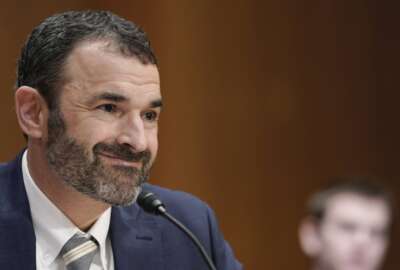

The IRS is bringing back a former leader experienced at helping the agency overcome challenges and congressional scrutiny.
The IRS is bringing back a former leader experienced at helping the agency overcome challenges and congressional scrutiny.
The Senate in a 54-42 vote Thursday approved Danny Werfel, a former acting IRS commissioner under the Obama administration, to serve as the agency’s permanent commissioner for a five-year term.
Sen. Joe Manchin (D-W.Va.) was the only Democrat to vote against Werfel.
Sens. Bill Cassidy (R-La.), Susan Collins (R-Maine), Chuck Grassley (R-Iowa), Lisa Murkowski (R-Alaska), Thom Tillis (R-N.C.), and Todd Young (R-Ind.) voted in favor of Werfel, in a split from all other Senate Republicans present for the vote.
Werfel will be the first IRS commissioner to spend a significant portion of the nearly $80 billion in the Inflation Reduction Act meant for the agency to rebuild its workforce and modernize its legacy IT over the next decade.
Meanwhile, the Biden administration proposes giving the IRS a $14.1 billion budget for fiscal 2024 “to ensure that taxpayers receive the highest quality customer service and that all Americans are treated fairly by the U.S. tax system.”
The proposed 2024 budget for the IRS is a $1.8 billion, or 15%, increase from current levels.
The Biden administration, in its 2024 budget proposal, said the IRA funding will allow the IRS to modernize IT infrastructure and “rebuild the administrative capacity of the agency.”
But to maximize the impact of this investment, the White House said the IRS also needs regular increases in its annual budget.
“To realize these goals and support timely and robust implementation of the important tax provisions in the Inflation Reduction Act, annual discretionary appropriations are necessary to maintain current services and allow the IRS to utilize the long-term funding for transformative modernization,” the White House wrote in its budget proposal.
Congress in its 2023 omnibus spending bill gave the IRS a flat budget, compared to 2022 levels.
The Biden administration said that flat budget gave the agency no additional resources “to continue and accelerate the development of new digital tools to enable better communication between taxpayers and the IRS.”
Werfel, during his confirmation hearing, said he’d focus on the IRS answering more phone calls and shrinking a growing tax gap between what taxpayers owe and what the agency is able to collect each year. He said he’d also prioritize staffing up Taxpayer Assistance Centers for in-person help and making more tax-help resources available online.
Prior to his nomination, Werfel called on Congress to give the IRS enough funding to help it recover from a decade of budget cuts. Those cuts have led to a reduction in the agency’s workforce and deferred upgrades in the agency’s legacy IT.
“From the bottom of my heart, the IRS is an extraordinary agency. It’s resilient, it does an amazing job running a very complex process, which the nation’s tax system is. And it’s been an agency that has been on a lower and lower resource footprint over time — versus what it needs to fully modernize and meet its mission,” Werfel said in an April 2021 interview.
Former President Barack Obama named Werfel as acting IRS commissioner in 2013, after the agency came under fire for excessive conference spending and scrutinizing the tax-exempt status of conservative political organizations.
Senate Finance Committee Chairman Ron Wyden (D-Ore.) said Wednesday that Werfel has “helped right the ship and improve confidence in the IRS,” while serving as acting commissioner.
“He has made it clear he’s going to make sure that the IRS does its job consistent with the law, and that transparency will be a top priority for his service,” Wyden said on the Senate floor Wednesday. “He’s focused on building trust, and this means a lot, because Mr. Werfel’s done that at the IRS before.”
Werfel also served as the Office of Management and Budget’s controller, a position that’s been vacant for more than five years.
As OMB controller, Werfel led an interagency effort to oversee $787 billion of stimulus spending in the aftermath of the 2008 financial crisis. He also helped lead the federal government through the 2013 sequestration.
The IRS has already shown significant improvement in its level of customer experience to taxpayers this filing season.
While the IRS only managed to answer about 13% of taxpayers’ calls last year, the IRS, so far this filing season, has answered about 90% of incoming phone calls and has processed more than 90% of returns filed so far.
Wyden said the IRS has been able to significantly improve its level of service to taxpayers by spending only about 1% of the $80 billion in the Inflation Reduction Act.
“That’s a record that we ought to put a lot of focus on, because if it continues, it will be a historic return on investment. We expect it to continue,” he said.
The IRS, meanwhile, is expanding its digital scanning capabilities to reduce its manual, paper-based workload.
The agency, through its new Digital Intake Initiative, has scanned more than 120,000 paper forms submitted in 2023 by employers to pay for unemployment compensation to workers who have lost their jobs. That’s more than 20 times what the IRS was able to scan all of last year.
The IRS expects to soon be able to digitally scan more forms later this year, and significantly reduce processing times.
While the vast majority of tax returns are filed electronically, the IRS still receives millions of paper forms every year, which require much more time to process than digital forms.
“This expansion of scanning is another milestone for the IRS as we work to transform the agency,” said Acting IRS Commissioner Doug O’Donnell. “We anticipate expanding scanning of more paper returns in the near future, saving time and creating efficiencies for taxpayers, the business community as well as tax professionals and the IRS.”
Treasury Secretary Janet Yellen has directed the IRS to prioritize improvements to taxpayer experience with the IRA funding it has received. The IRS was expected to release the report in February, but it has missed that deadline.
Werfel told the Senate Finance Committee that the IRS, under his leadership, would publicly release that plan.
“We’re convinced that he is going to follow that directive to focus on getting us the plan and ensure that the focus is on better service,” Wyden said.
The White House’s 2024 budget proposal would give the IRS an additional $642 million to improve taxpayer experience and expand customer service outreach “to underserved communities and the entire taxpaying public.”
The administration’s budget proposal would give the IRS $290 million to upgrade IT systems as part of its multi-year Business Systems Modernization initiative.
The White House expects its 2024 proposed budget, combined with IRA spending, will help the IRS shrink a growing tax gap between what taxpayers owe and what the agency is able to collect.
Copyright © 2025 Federal News Network. All rights reserved. This website is not intended for users located within the European Economic Area.
Jory Heckman is a reporter at Federal News Network covering U.S. Postal Service, IRS, big data and technology issues.
Follow @jheckmanWFED


